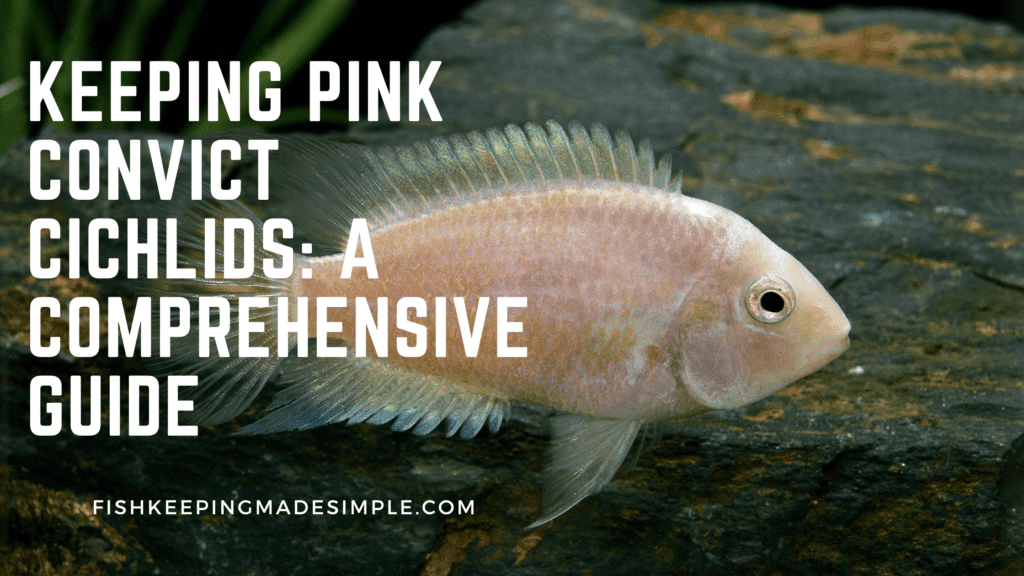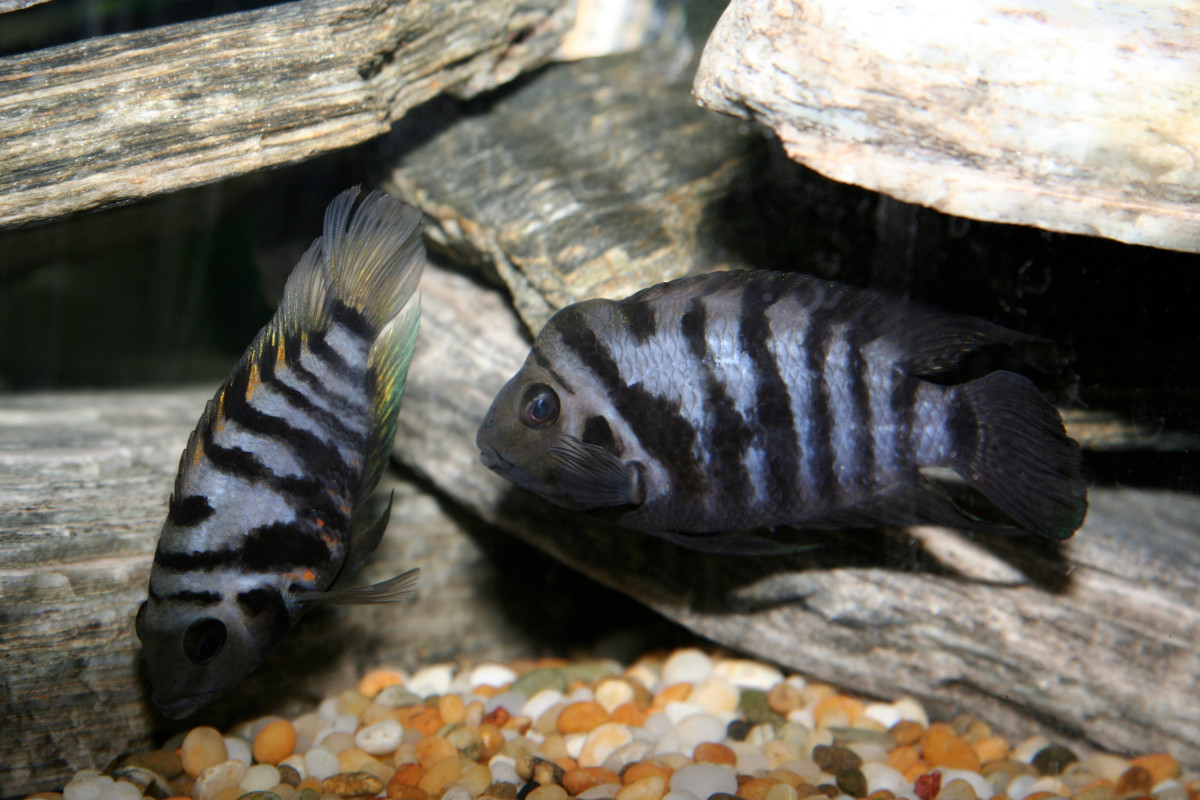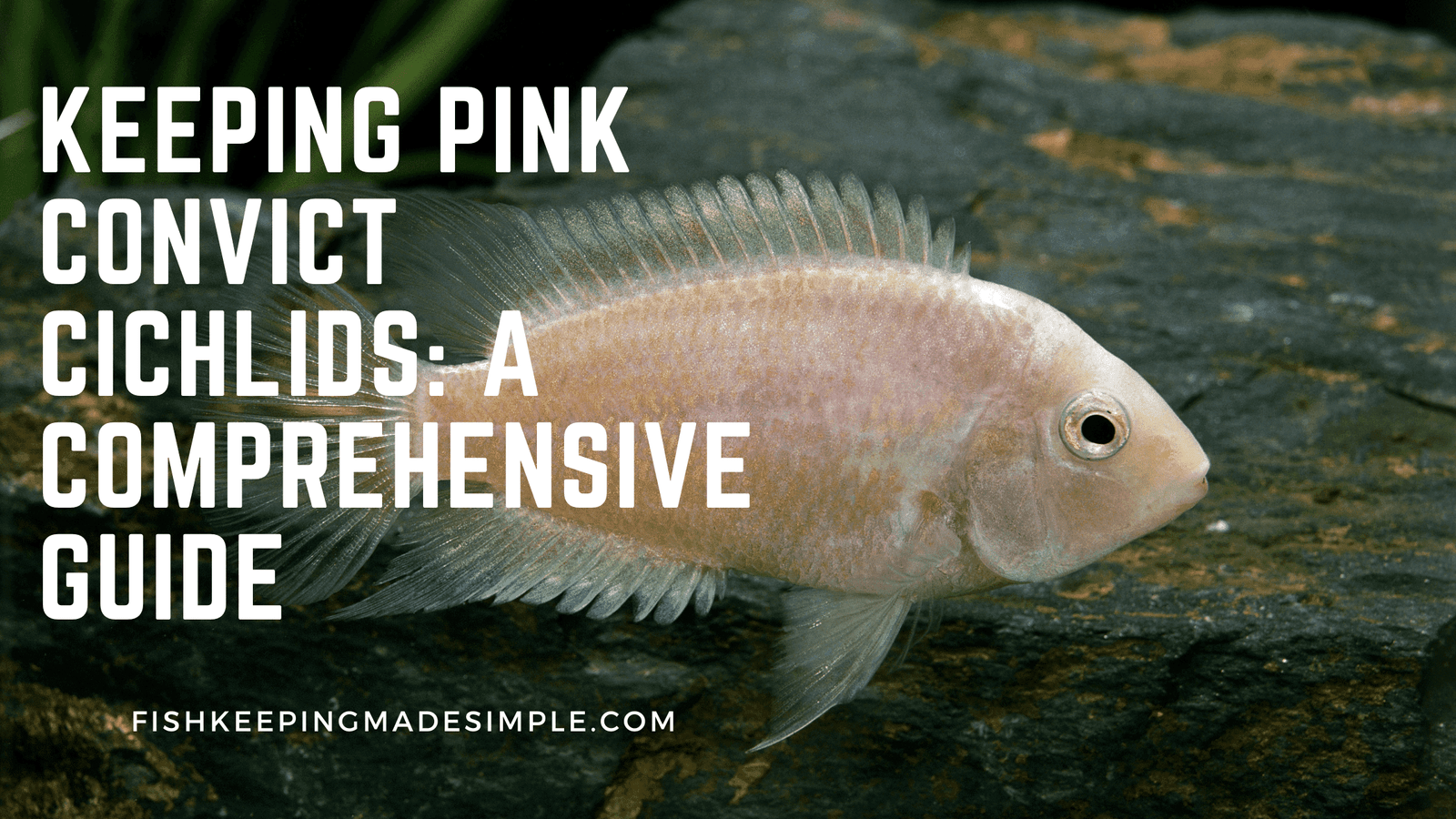Convict Cichlids are prone to health issues like Ich, fin rot, and parasitic infections. Regular tank maintenance and proper diet help prevent these problems.
Convict Cichlids, known for their striking appearance and hardy nature, are popular in home aquariums. These fish can face health challenges that, if left unchecked, may lead to serious conditions. Common health problems include Ich, which manifests as white spots, and fin rot, where fins appear ragged or discolored.
Parasitic infections also pose a threat, often indicated by unusual behavior or physical changes. Maintaining clean water conditions, providing a balanced diet, and observing fish regularly are key to ensuring their well-being. This proactive approach helps keep Convict Cichlids healthy and thriving in their aquatic environment.
Common Health Issues
Convict cichlids are hardy fish but can face several health problems. It’s important to know the common health issues they might encounter. This way, you can act quickly and provide the right care.
Ich And Parasites
Ich is a common issue for convict cichlids. It’s also known as white spot disease. Small white spots appear on the fish’s body and fins. This can cause itching and discomfort. Parasites are another problem. They can attach to the fish and cause harm. These can be internal or external parasites.
Here are some signs to look for:
- White spots on the body
- Scratching against objects
- Loss of appetite
- Clamped fins
To treat ich and parasites, you can use special fish medications. Make sure to follow the instructions carefully.
Bacterial Infections
Bacterial infections can affect convict cichlids too. They can cause serious problems if not treated quickly. Symptoms include red sores, swollen spots, and ulcers. Sometimes, the fish may have frayed fins. These infections can spread fast in the tank.
Here are the common symptoms:
- Red sores on the body
- Swollen spots
- Ulcers
- Frayed fins
Bacterial infections often need antibiotic treatments. Make sure the water is clean and well-maintained.
Fungal Infections
Fungal infections can also affect convict cichlids. They usually appear as white or gray patches on the fish. These patches are often fuzzy. Fungal infections can occur when the water quality is poor. Injuries can also lead to fungal growth.
Signs of fungal infections include:
- White or gray patches
- Fuzzy growth on the skin
- Loss of appetite
- Slow movement
Treat fungal infections with antifungal medications. Keeping the tank clean is crucial to prevent these infections.
| Health Issue | Signs | Treatment |
|---|---|---|
| Ich and Parasites | White spots, itching, loss of appetite, clamped fins | Special fish medications |
| Bacterial Infections | Red sores, swollen spots, ulcers, frayed fins | Antibiotic treatments |
| Fungal Infections | White/gray patches, fuzzy growth, loss of appetite, slow movement | Antifungal medications |

Credit: fishkeepingmadesimple.com
Symptoms To Watch For
Convict Cichlids are popular freshwater fish. They need proper care to thrive. Knowing the symptoms of health problems is crucial. This guide will help you identify and understand key signs.
Behavioral Changes
Behavioral changes are often the first signs of illness. Watch for these specific behaviors:
- Lethargy: The fish moves slowly or hides a lot.
- Loss of Appetite: The fish stops eating or eats less.
- Erratic Swimming: The fish swims in circles or upside down.
- Aggression: The fish becomes unusually aggressive.
Physical Signs
Physical signs are easier to spot. Regularly inspect your Convict Cichlid for these issues:
| Symptom | Possible Cause |
|---|---|
| White Spots | Ich disease |
| Faded Colors | Stress or poor diet |
| Swollen Abdomen | Bloating or internal infection |
| Frayed Fins | Fin rot or aggression |
| Red Streaks | Bacterial infection |
Water Quality Indicators
Water quality affects fish health. Poor water conditions can lead to illness. Monitor these indicators:
- Ammonia Levels: High levels can be toxic.
- Nitrite Levels: Elevated nitrite is harmful.
- Nitrate Levels: High nitrate can stress fish.
- pH Levels: Sudden changes can shock fish.
- Water Temperature: Keep the temperature stable.
Maintaining good water quality is essential for your Convict Cichlid’s health. Regularly test and adjust your tank conditions.
Preventive Measures
Keeping Convict Cichlids healthy requires simple yet effective preventive measures. Proper care can help avoid many health issues. Let’s explore essential steps to keep these fish thriving.
Water Quality Management
Good water quality is crucial for Convict Cichlids’ health. Regular water changes are essential. Aim for a 20-25% water change every week.
Maintain the water temperature between 75-80°F (24-27°C). Use a reliable aquarium heater. Test the water pH regularly. It should stay between 6.5 and 8.0.
Filter the water efficiently. Use a filter suitable for your tank size. Keep the ammonia, nitrite, and nitrate levels in check. High levels can stress the fish.
A balanced diet is key to healthy Convict Cichlids. Feed them a mix of pellets, flakes, and live foods. Include brine shrimp, bloodworms, and daphnia in their diet.
Provide variety to ensure they get all necessary nutrients. Avoid overfeeding. Feed them small portions 2-3 times a day.
Remove any uneaten food after 5 minutes. This helps keep the water clean. Ensure the food size matches the fish’s mouth size.
Tank Hygiene
Keeping the tank clean helps prevent diseases. Clean the tank walls and decorations regularly. Use an algae scraper to remove algae from the glass.
Vacuum the gravel to remove debris and waste. Perform this during your weekly water changes.
Inspect the tank for any signs of mold or fungus. Remove any dead plants or fish immediately. They can contaminate the water.
Maintain proper tank hygiene to ensure a healthy environment. A clean tank means happy, healthy Convict Cichlids.
Effective Treatments
Convict cichlids are hardy, but they can face health issues. Knowing the right treatments can save their lives. This section explores various treatments, including medications, natural remedies, and quarantine procedures.
Medication Options
Medications can be the fastest way to treat sick convict cichlids. Here are some common options:
- Antibiotics: Help fight bacterial infections.
- Antifungals: Useful for fungal infections.
- Parasite treatments: Effective against parasites.
Always follow the dosage instructions on the medication. Overdosing can harm your fish. Consult a vet for the best advice.
Natural Remedies
Natural remedies can also help your convict cichlids. They are often safer and cheaper:
- Salt baths: Use aquarium salt to treat external issues.
- Garlic: Boosts immune system and helps with parasites.
- Aloe Vera: Heals wounds and reduces stress.
Use these remedies carefully. Always monitor your fish for any adverse reactions.
Quarantine Procedures
Quarantine is crucial to prevent the spread of disease. Follow these steps:
- Set up a separate tank with clean water.
- Add a filter and heater to maintain water quality.
- Observe the sick fish for 2-4 weeks.
- Treat the fish as needed based on symptoms.
- Only return the fish to the main tank when fully recovered.
Quarantine helps protect your other fish. It ensures that diseases do not spread.
Importance Of Water Quality
Maintaining high water quality is crucial for the health of your Convict Cichlids. Poor water conditions can lead to stress, disease, and even death. Ensuring clean water helps your fish thrive and live longer.
Regular Testing
Regular testing of your aquarium water is essential. Use a water testing kit to check pH, ammonia, nitrites, and nitrates. Keep a log of your results to track any changes.
- Test pH levels weekly
- Check ammonia levels bi-weekly
- Monitor nitrites and nitrates monthly
Consistent testing helps you catch problems early. It allows you to take corrective actions quickly.
Filtration Systems
A good filtration system is vital for maintaining water quality. Filters remove waste, toxins, and uneaten food. There are different types of filters:
| Filter Type | Function |
|---|---|
| Mechanical | Removes debris |
| Biological | Breaks down ammonia |
| Chemical | Removes toxins |
Choose a filter that matches your tank size. Clean your filter regularly to keep it working efficiently.
Water Changes
Regular water changes are necessary to maintain water quality. Changing 10-20% of the water weekly helps remove toxins and refreshes the environment.
- Turn off any electrical equipment
- Remove 10-20% of the water
- Add fresh, dechlorinated water
- Turn on the equipment
This routine keeps your tank environment stable. It ensures your Convict Cichlids stay healthy and happy.
Credit: www.cichlid-forum.com
Diet And Nutrition
Convict Cichlid health is deeply connected to their diet and nutrition. A balanced diet ensures they stay strong and vibrant. Proper feeding habits help prevent common health problems.
Balanced Diet
A balanced diet is key for Convict Cichlid health. They need both plant and animal-based foods. These fish are omnivores. Offer them a variety of foods for complete nutrition. Use high-quality flake or pellet food as the base. Supplement with live or frozen foods like brine shrimp and bloodworms. Fresh vegetables like peas and spinach are also good.
| Food Type | Examples | Benefits |
|---|---|---|
| Base Food | Flakes, Pellets | Complete nutrition |
| Live/Frozen Food | Brine Shrimp, Bloodworms | Protein-rich |
| Vegetables | Peas, Spinach | Vitamins and fiber |
Feeding Frequency
Feeding frequency affects Convict Cichlid health. Feed adult cichlids twice a day. Young cichlids need more frequent feeding. Feed them three to four times daily. Avoid overfeeding. It can lead to health problems and water pollution. Offer only what they can eat in 2-3 minutes.
Supplements
Supplements can enhance Convict Cichlid diet. Vitamins and minerals are important. They support growth and immune health. Add liquid supplements to their food or water. Calcium supplements strengthen their bones. Spirulina boosts their color and health.
- Vitamins: Enhance immune health
- Calcium: Strengthen bones
- Spirulina: Boosts color and health
Stress Reduction
Stress is a significant health issue for Convict Cichlids. Stress can lead to various health problems, including weakened immune systems. Reducing stress is crucial for their well-being. Here are some effective ways to reduce stress for Convict Cichlids:
Appropriate Tank Size
Convict Cichlids need enough space to swim freely. A small tank can cause stress. A tank size of at least 30 gallons is ideal. Larger tanks provide more swimming space and reduce aggression. Ensure the tank is not overcrowded.
Hiding Spots
Hiding spots are essential for Convict Cichlids. They need places to retreat and feel safe. You can create hiding spots with rocks, plants, and caves. Make sure to provide multiple hiding spots. This helps reduce stress and aggression.
Compatible Tank Mates
Choosing the right tank mates is vital. Not all fish are compatible with Convict Cichlids. Avoid aggressive or overly passive fish. Suitable tank mates include:
- Other Convict Cichlids
- Firemouth Cichlids
- Green Terrors
Ensure that tank mates have similar temperaments. This helps maintain a peaceful environment.

Credit: pethelpful.com
Regular Monitoring
Regular monitoring is vital for keeping convict cichlids healthy. This involves observing their behavior, conducting health checkups, and keeping accurate records. By doing this, you can spot potential issues early and take action.
Health Checkups
Conduct regular health checkups to ensure your convict cichlid’s well-being. Check their gills, fins, and scales for any signs of disease. Look for unusual spots, discoloration, or damage.
| Body Part | Signs to Watch For |
|---|---|
| Gills | Redness or swelling |
| Fins | Tears or fraying |
| Scales | Spots or discoloration |
Behavioral Observations
Observe your convict cichlid’s behavior daily. Normal behavior includes swimming actively and eating well. If your fish hides often or refuses food, it may be ill.
- Swimming patterns
- Eating habits
- Interaction with other fish
Watch for signs of stress or aggression. These behaviors can indicate health problems. Addressing these issues promptly can prevent further complications.
Record Keeping
Keep detailed records of your convict cichlid’s health. Note any changes in behavior, appearance, or appetite. This information can help you and your vet diagnose issues quickly.
- Record dates of health checkups
- Note any treatments administered
- Track changes in diet or behavior
Maintaining accurate records helps in understanding your fish’s health trends. This proactive approach ensures timely intervention.
Frequently Asked Questions
How Long Do Convict Cichlids Live?
Convict cichlids typically live for 8 to 10 years. Proper care and a healthy environment can extend their lifespan.
How To Cure Cichlid Disease?
To cure cichlid disease, isolate the infected fish. Use appropriate medication based on symptoms. Maintain clean water conditions. Adjust water temperature if needed. Provide a balanced diet to boost immunity.
Why Is My Convict Cichlid Turning Orange?
Your convict cichlid is turning orange due to maturity, diet, or stress. Bright colors often indicate good health and breeding readiness.
How Old Do Convict Cichlids Get?
Convict cichlids typically live for 8 to 10 years. Proper care and a healthy environment can extend their lifespan.
Conclusion
Maintaining a healthy environment is crucial for Convict Cichlid wellbeing. Regular tank cleaning prevents common health issues. Monitoring water quality and diet helps ensure your fish thrive. Addressing problems early can save your Convict Cichlid from severe diseases. With proper care, your Convict Cichlids will lead happy and healthy lives.
